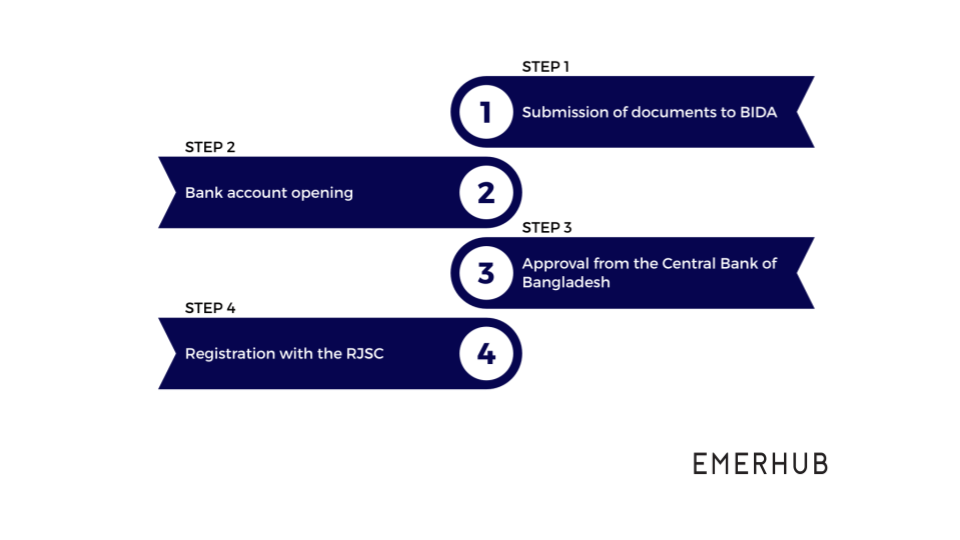Table of contents
As an alternative to incorporating a company, you can expand to Bangladesh by setting up a branch office of a foreign compny. In this article, we are going to show you the step-by-step process of registering a branch office in Bangladesh.
Allowed activities for a branch office in Bangladesh
A branch serves as an extension of its parent company, meaning, there will be no separate legal entity established. Its parent company is liable for the branch office’s debts or any other obligations and activities.
One of the main differences between a branch and a liaison/representative office is that with a prior approval from the Bangladesh Investment Development Authority (BIDA), a branch can engage in commercial activities. For instance, a branch can:
- collect payments on behalf of the parent company
- have local sources of income
- make outward payments from Bangladesh with a prior approval from the BIDA
Requirements for branch registration
There is no requirement for how long the parent company needs to be registered in its country of domicile and any legally established company that has audited accounts with a proven operational record can open a branch office in Bangladesh.
The primary requirement for the establishment of a branch is an approval from the Bangladesh Investment Development Authority (BIDA).
To get the approval, you need to submit the following documents to BIDA:
- Filled application form signed by the authorized person
- Memorandum of Association, Articles of Association, and Certificate of Incorporation of the parent company
- Names and nationalities of the directors or promoters of the parent company
- Audited accounts of last financial year of the parent company
- Company’s board of directors resolution regarding the opening of an office in Bangladesh
- Proposed organogram of the office including both expatriates and local personnel
- Details of activities of the branch office in Bangladesh
- Forwarding letter
The concerned Bangladesh Embassy/High Commission of the respective country or the country’s apex business chamber must also attest all documents accompanying the application and the forwarding letter.
BIDA requires four copies of all the documents mentioned. Also, you must translate any documents that are not stated in English before submission.
Minimum capital requirement
As branch offices are not separate legal entities, they do not have any minimum capital requirement.
In Bangladesh, however, there is a requirement for a minimum of US$ 50,000 inward remittance for all types of entities registered, including branches and representative offices. This inward remittance should cover the initial establishment cost and six months of operating expenses.
The step-by-step process of branch registration in Bangladesh
The average establishment of a branch in Bangladesh ranges from 45-60 days.
#1 Submission of documents to BIDA
As the first step of branch registration in Bangladesh, you need to submit all the required documents to BIDA. After a thorough inspection, BIDA officials will place the application and documents to the Inter-Ministerial Committee who, if satisfied, will provide the approval.
The average timeline for this is one month or less. Also, note that the BIDA may also ask for more documents or a physical representation which will make the process longer. For this reason, it is essential to prepare the documents thoroughly.
#2 Bank account opening
After obtaining the approval for opening a branch office in Bangladesh, the next step is to open an account in any Bangladeshi bank.
As already mentioned above, a branch does not need any minimum paid-up capital. However, in Bangladesh it is necessary to inject a remittance of US$ 50,000 within two months from the date of issuance of the BIDA permission letter.
You can use it for covering operational and establishment costs, visas, food, residence, etc.
#3 Approval from the Bangladesh Bank
All branch, liaison, and representative offices will also have to report to the central bank of Bangladesh within thirty days of obtaining permission from Bangladesh Investment Development Authority (BIDA).
#4 Registration with the RJSC
The Registrar of Joint Stock Companies and Firms (RJSC) is the governing authority in Bangladesh.Finally, after obtaining an approval from both Bangladesh Bank and BIDA, the last step is registration with the RJSC.
For that, you need to submit the following documents:
- Approval letters from BIDA and the Central Bank of Bangladesh
- Certified copies of the Memorandum of Association and Articles of Association or other constitutional documents
- Full address of the registered or principal office of the company
- List of the directors and secretary (if any) of the company
- The name and address of a Bangladeshi who may represent the company in processing and accepting documents
- The full address of the office of the company in Bangladesh
The approval is usually provided to establish a branch or liaison office initially for a period of three years but it can also be extended.
It is also possible to open several branch offices in Bangladesh, however, a separate BIDA approval is necessary for each of the offices.
Employing foreign employees
If you intend to hire any foreign nationals in your branch office in Bangladesh, keep in mind that you also need to secure their work permits.
In order to be able to work in Bangladesh, foreign employees also need a work permit. It is a multiple-entry visa and initially, it is valid for 3 months but can be extended afterward.
A branch manager can be a foreigner but he/she should be a resident in Bangladesh. Also, note that the Bangladeshi law limits a maximum of 5% of foreigner employees in a branch.
How to start with registering a branch in Bangladesh?
Get in touch with Emerhub via the form below to start with registering a branch in Bangladesh. We’ll be glad to help you with the entire process.








